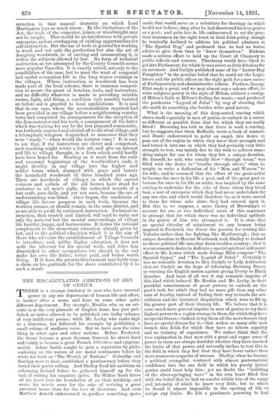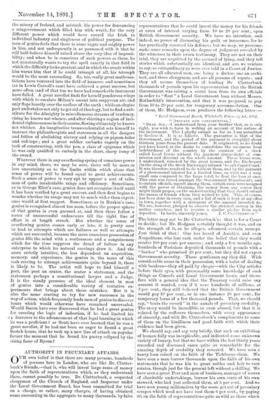THE MISCALCULATED AMBITIONS OF MEN OF GENIUS.
THERE is a strange tendency in men who have unusual power in any one department of human life and effort, to hanker after a name and fame in some other quite different department. For example, Ruskin, who as an art- critic is at the very pinnacle of English fame, has just pub- lished, or rather allowed to be published, two bulky volumes of very indifferent poems ; while Mr. Lecky, who ranks high as a historian, has followed his example by publishing a small volume of mediocre verse. But we have seen the same thing in other ages and other nations. Before Frederick the Great became a great German General, he strove hard and vainly to become a great French littgrateur and epigram- matist. Adam Smith sought to gain a reputation by philo- sophising on the nature of our moral sentiments before he wrote his book on " The Wealth of Nations." Coleridge and Southey were to have established a pantisocracy before they found their poetic calling. And Shelley fixed his ambition on reforming Ireland before he gathered himself up for the task of writing his exquisite lyrics. Sir Walter Scott threw all his heart into the foundation of an ideal lairdship, and wrote his novels more for the sake- of reviving a great ancestral house than for the love of literature. And even Matthew Arnold endeavoured to produce something syste-
matic that would serve as a substitute for theology (in which he did not believe), long after he had discovered his true genius as a poet ; and quite late in life endeavoured to set the prac- tical statesmen on the right track in their Irish policy, though he ironically declined to address his political admirers at " The Spotted Dog," and professed that he had no better advice to give them than to "know themselves." Dickens made a serious effort to hold up the Court of Chancery to public ridicule and censure. Thackeray would have liked to get into Parliament, for which he was about as little fitted as for an aeronaut. And Carlyle published some of his " Latter-Day Pamphlets" in the genuine belief that he could set the Legis- lature and the public offices on the right path for a new career of Parliamentary and administrative reform. Farther, George Eliot made a great, and we may almost say a solemn effort, to write religious poetry in the style of Milton, without a vestige of Milton's faith or Milton's feeling for music,—and produced the ponderous "Legend of Jubal" by way of showing that she could do something else besides write good novels.
What is the meaning of this deep-seated craving which shows itself especially in men of genius, to embark in a career as different as possible from that for which they are really fitted ? Browning has told us that there is such a craving, but he suggests that when Raffaelle wrote a book of sonnets, and Dante endeavoured to paint an angel, this desire to pass out of the region in which they knew their strength and had tested it, into one in which they had probably very little strength to test, was mainly due to the wish to achieve some- thing unique for one for whom they felt a unique devotion. He himself, he said, who usually blew " through brass," was filled with the desire to "breathe through silver," when he sought to write a dedication of his "Men and Women" to his wife ; and he assumed that the effort of the great artist to become for once in his life a poet, and of the great poet to become for once in his life an artist, was inspired by the same craving to undertake for the sake of those whom they loved.
best, a sort of enterprise which they had never undertaken for any one else, and which would therefore be, as it were, sacred to those for whose sake alone they had entered upon it.
But this is, we suppose, a mere theory of Browning's to account for one or two individual cases of this eagerness to attempt that for which there was no individual aptitude in the genius of him who attempted it. It is clear that no special chivalry of attachment to any human being inspired in Frederick the Great the passion for writing like Voltaire rather than for fighting like Marlborough ; that no unique devotion to Harriet Westbrook took Shelley to Ireland to throw political life into that down-trodden country ; that it was no romantic desire to dedicate a special spiritual and moral effort to Mr. Lewes which made George Eliot compose " The Spanish Gypsy" and " The Legend of Jubal." Certainly it was no romantic devotion to Mrs. Carlyle or Lady Ashburton that set Carlyle on the hope of reforming Downing Street, or warning the English nation against giving liberty to Black Quashee. And least of all was it any romantic impulse of this kind which induced Mr. Ruskin and Mr. Lecky, in their youthful consciousness of great powers, to embark on the poet's task, for which they had no more gift than any other man of faculty, instead of feeling their way towards the art- criticism and the historical disquisition which were to fill up the greater part of their literary life. We believe that it is some much more general impulse in men of genius to try their highest powers in a region strange to them, for which they have no special fitness,—indeed, to try them all the more because they have no special fitness for it, that makes so many able men launch into fields for which they have no inborn capacity and no training of experience. We rather think that the true explanation is, that men with a great and vague sense of power in them are always doubtful whether they have reached the limits of that power, and naturally incline to test this in the field in which they feel that they have fewer rather than more numerous auguries of success. Shelley, when he became a political evangelist, ventured with almost preternatural confidence into the one field in which his purely lyrical genius could least help him; yet no doubt the "bubbling of the silver-springing wave " in his own heart filled him with the belief that he had an amulet within him of the range and intensity of which he knew very little, but to which he found it almost impossible in the opening of life to assign any limits. He felt a passionate yearning to heal the misery of Ireland, and mistook his power for denouncing a misgovernment which filled him with wrath, for the very different power which would have roused the Irish to individual industry and singleness of political purpose. The man of genius feels that there is some vague and mighty power in him, and not unfrequently is so possessed with it that he will half-believe himself raised above the very idea of impossi- bility; and when he is conscious of such powers as these, he not unnaturally wants to try the spell exactly in that field in which the difficulty looks greatest, and in which the oracle within him warns him that if he could triumph at all, his triumph would be the most astounding. So, too, really great mathema- ticians have ventured into the field of humour, and sometimes (as in Lewis Carroll's case) have achieved a great success, but more often (and of that too we have had remarkable instances) have failed. A great novelist finds for herself ponderous wings with which to emulate Milton's ascent into empyrean air, and only flaps heavily over the surface of the earth ; while an elegiac poet undertakes not only to get rid of theology, but to find a sub- stitute for the Almighty in miscellaneous streams of tendency, rising he knows not whence, and after skirting a region of inci- dental righteousness in theircourse, flowing ultimately he knows not whither. An imaginative transcendentalist sets himself to instruct the philanthropists and statesmen in all the dangers and follies of abolishing slavery and relying on pigeon-holes and red-tape ; and a great soldier embarks eagerly on the task of constructing, with the pen, a class of epigrams which he was only qualified to embody in the short, sharp irony of the sword.
Wherever there is any overflowing spring of conscious power in any mind, there, we may be sure, there will be more or less uncertainty as to the limits within which alone that sense of power will be found equal to great achievements. Such a sense of power is very apt to appear a sort of talis- man of quite incalculable range and efficiency. Sometimes, as in George Eliot's case, genius does not recognise itself until it has been verified by a great success, and then first begins to wonder whether its range may not be much wider than experi- ence would at first suggest. Sometimes, as in Ruskin's case, genius is recognised almost too soon, before the proper sphere of that genius is even guessed at, and then there follow a series of unsuccessful endeavours till the right line of effort is at length struck. But whether the sense of overflowing genius comes early or late, it is pretty sure to lead to attempts which are failures as well as attempts which are successful, because the mere conscious possession of genius fills the mind with a restlessness and a sanguineness which for the time suppress the dread of failure in any enterprise to which its natural cravings draw it. And the more strictly intuitive, the less dependent on acquisition, memory, and experience, the genius is, the more of this rash craving to attempt achievements quite beyond it, there is likely to be. The artist will hope to find himself a poet, the poet an orator, the orator a statesman, and the statesman perhaps a constitutional lawyer and a Judge. It is the steady pressure of the ideal element in men of genius into a considerable variety of tentative ex- periments that brings about these mistakes. But it is also the same craving to try for new successes in the way of action, which frequently leads men of genius to discover bents which would otherwise have remained nnrevealed. Would Bacon have ever discovered that he had a great genius for creating the logic of induction, if he had limited his e deavours to the advancement of that legal learning in which he was a proficient ? or Scott have ever learned that he was a great novelist, if he had not been so eager to found a great Scotch house, that he took up a new line of attack on popular favour the moment that he found his poetry eclipsed by the rising fame of Byron ?







































 Previous page
Previous page